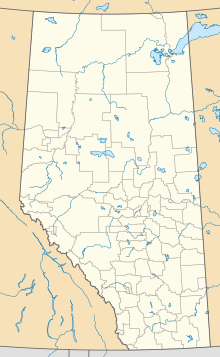Ashmont, Alberta
Ashmont | |
|---|---|
Hamlet | |
 Location of Ashmont in Alberta | |
| Coordinates: 54°07′45″N 111°34′05″W / 54.12917°N 111.56806°WCoordinates: 54°07′45″N 111°34′05″W / 54.12917°N 111.56806°W | |
| Country | Canada |
| Province | Alberta |
| Census division | No. 19 |
| Municipal district | County of St. Paul No. 19 |
| Area | |
| • Land | 1.11 km2 (0.43 sq mi) |
| Population (2016)[1] | |
| • Total | 133 |
| Time zone | UTC−7 (MST) |
| • Summer (DST) | UTC−6 (MDT) |
Ashmont, Alberta is a hamlet in northern Alberta, Canada within the County of St. Paul No. 19.[2] It is located near the intersection of Highway 28 and Highway 36, approximately 33 kilometres (21 mi) northwest of the Town of St. Paul. It has an elevation is 2,073 feet (632 m).
Ashmont is surrounded by numerous lakes, such as Upper Mann Lake, Batty Lake, Lottie Lake, Floatingstone Lake and Garner Lake. Many provincial recreation areas are established on the shores of these lakes.
A first settler named the community after his native home in Ashmont, Boston.[3] Ashmont began as a farming community in the early part of the 20th century. At its peak in the 1960s it boasted a grain elevator, four general stores, a pool hall, Legion Hall, two gas stations and a school. As is typical of many small rural communities it has fallen on hard times. Only one store remains, kept alive by the local lake communities and a relatively large school (K to 12).
Demographics[]
As a designated place in the 2016 Census of Population conducted by Statistics Canada, Ashmont recorded a population of 133 living in 47 of its 65 total private dwellings, a change of -29.3% from its 2011 population of 188. With a land area of 1.11 km2 (0.43 sq mi), it had a population density of 119.8/km2 (310.3/sq mi) in 2016.[1]
As a designated place in the 2011 Census, Ashmont had a population of 188 living in 70 of its 79 total dwellings, a 26.2% change from its 2006 population of 149. With a land area of 1.12 km2 (0.43 sq mi), it had a population density of 167.9/km2 (434.7/sq mi) in 2011.[4]
See also[]
References[]
- ^ a b c "Population and dwelling counts, for Canada, provinces and territories, and designated places, 2016 and 2011 censuses – 100% data (Alberta)". Statistics Canada. February 8, 2017. Retrieved February 13, 2017.
- ^ "Specialized and Rural Municipalities and Their Communities" (PDF). Alberta Municipal Affairs. January 6, 2021. Retrieved September 29, 2021.
- ^ Place-names of Alberta. Ottawa: Geographic Board of Canada. 1928. p. 13.
- ^ "Population and dwelling counts, for Canada, provinces and territories, and designated places, 2011 and 2006 censuses (Alberta)". Statistics Canada. 2012-02-08. Retrieved 2012-04-06.
- Hamlets in Alberta
- Designated places in Alberta
- County of St. Paul No. 19
- Northern Alberta geography stubs
